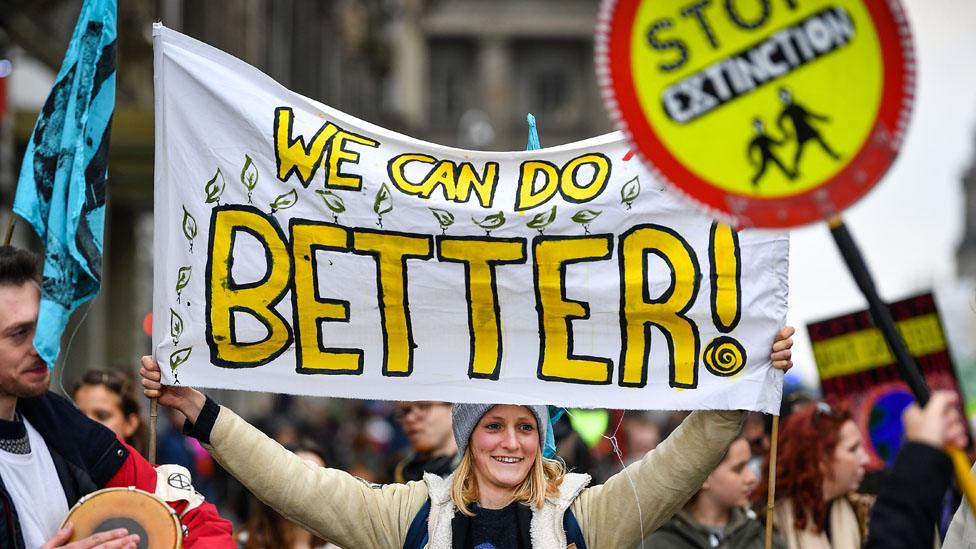Ruth's return
- Published
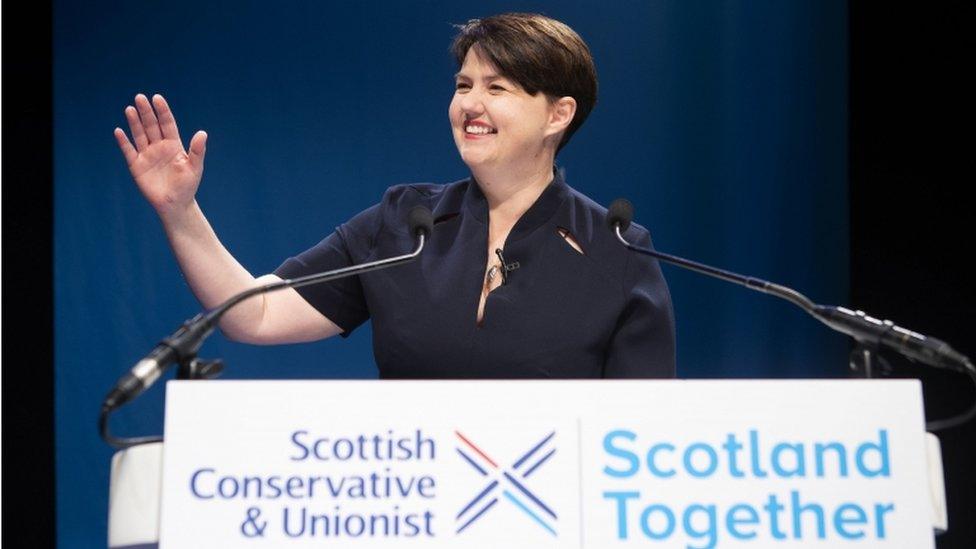
A curious event, the Scottish Conservative conference in Aberdeen. Overtly courageous, rather than truly confident.
It was as if every time the representatives rose to their feet to applaud their elected tribunes, their brain kicked in with a reminder of Brexit.
And, somehow, the applause was instantly damped or deflated.
But Ruth Davidson was, as is so often the case, the exception. Here, the applause was prolonged and enthusiastic.
Why? In essence, she side-stepped, quite deliberately, the key and chronic challenges confronting her party.
On Brexit, she said, in sum, "gonnae just sort it - via those talks with Labour. Take the message from the voters, tell the European Reform Group to go chase themselves - and cut a deal with the Opposition."
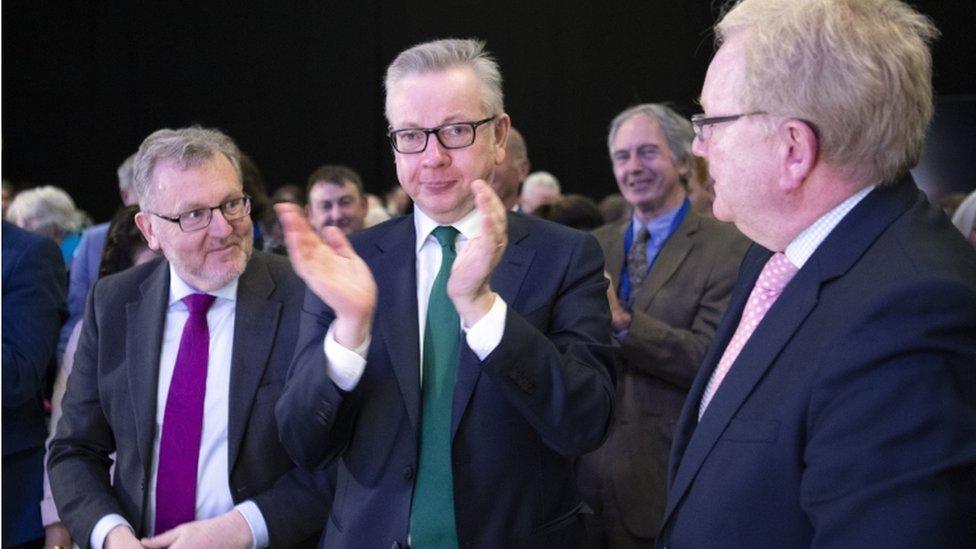
David Mundell at the Conservative party conference in Aberdeen with Michael Gove and Jackson Carlaw
David Mundell, the Scottish Secretary, made the same point vigorously on the BBC Scotland live programme. The ERG wouldn't vote for the PM's deal so she was entirely right to seek a cross-party deal, however much some Tories may scream.
But is the message from the English local elections quite as simple as Ms Davidson made out? Yes, the Tories went down, sharply. Yes, Labour - still equivocating somewhat on Brexit - went down too.
Apparent disquiet
Yet the big winners included the Liberal Democrats - whose every utterance includes a demand for a further EU referendum to reverse Brexit.
Is that not a sign of support for the concept of that second ballot? I guess Ruth Davidson looks at it primarily through the prism of the Conservative out-turn.
Voters felt hurt, they punished the Tories. And the Tories, according to Ms Davidson, require to respond by getting Brexit off the agenda.
But she didn't labour the point. Ditto the European Elections.
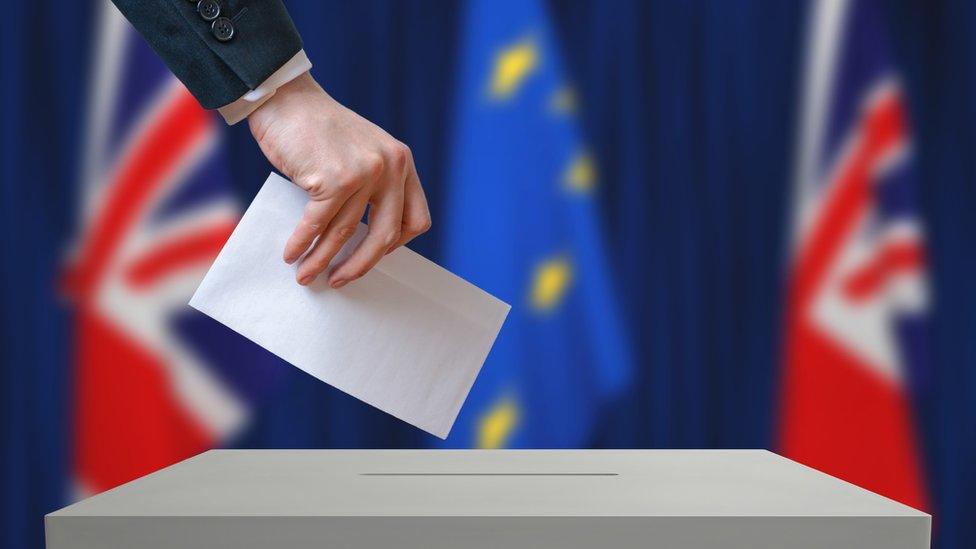
Rather amusing overnight tales told of disclosures from Ms Davidson's speech rehearsals. Her apparent disquiet about dealing with those elections scheduled, currently, for the 23rd of May.
After a light-hearted reference to the leak - she satirically blamed her offspring, Finn - Ms Davidson made but a single comment about the impending elections.
Was it an appeal to vote Tory? An appeal to activists to pound the streets and stamp the envelopes?
Repeated demands
Friends, it was not. It was a cursory warning that the Euro Elections could be even worse for the Tories than the English locals.
So did she focus then on the union, on the United Kingdom? Well, yes and no.
She stated, repeatedly, that she backed the existence of the UK. She lampooned Nicola Sturgeon's repeated demands for a rerun referendum.
She noted, again, that Westminster would not sanction an official referendum before the next Holyrood elections in 2021 (and the first minister, we know, wouldn't assay any other kind.)

But the Tory leader tried to move beyond the issue of choosing Scotland in the union - to the question of making choices within Scotland.
Inevitably, the policy announcements were mainly headlines, rather than detail at this stage. But it was a comprehensive package nevertheless. Economic growth, green energy, skills and vocational training.
As I discussed with guests on the live programme, there was little mention of the detailed taxation plans which would accompany this policy programme.
Wield power
Would the Conservatives move from their current opposition to the Scottish government's tax structure?
Expect rival parties to pose that question too, vigorously.
But this was a deliberate attempt by Ms Davidson to move beyond simply endorsing the union to arguing what Tories might do, were they in a position to wield power in Scotland.
It builds upon the strategy she envisaged after the last Holyrood elections when the Tories contrived to build relative success upon a staunch defence of the union.
They were able, at that time, to corral pro-union votes into their camp - and to gain, as a result.
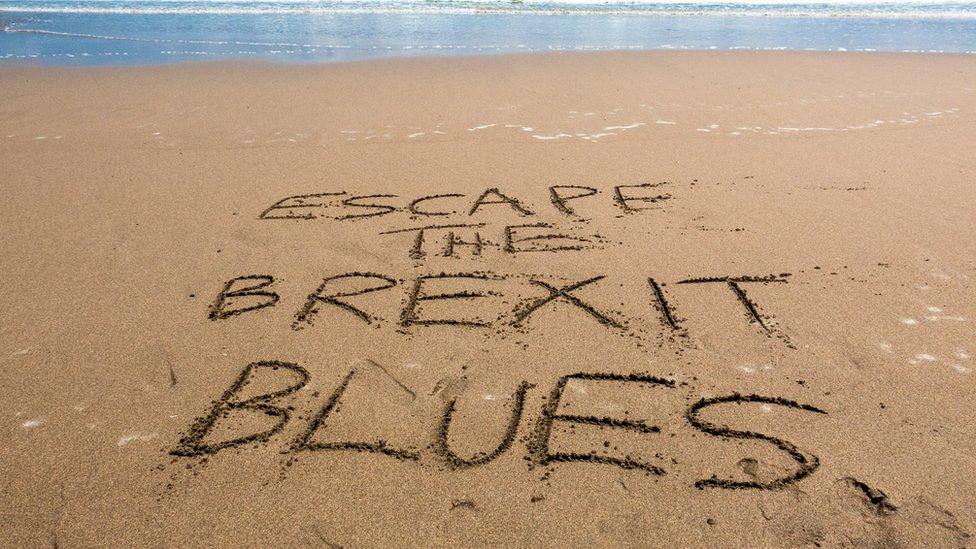
Ms Davidson's aim, deflected by the Brexit bourach, has been to construct a Conservative offer in Scotland that enables them to attract voters beyond that Unionist core.
She is saying, in essence: yes, we are the party of the union. We think you, the voters, get that concept and we thank you for that.
But have you had a glance at our policies on, say, the economy and education? Might you like those policies put into practice?
Persistent opposition
There are, of course, umpteen obstacles in the way. Right now, the Tories are going down in the popularity ranks, not up.
Secondly, it is rather a long time since they topped the popularity stakes in Scotland. The SNP and the others would have a verdict to offer on that.
Thirdly, Holyrood's proportional voting system was deliberately designed to prevent one party - Labour had the SNP in mind - winning a majority of seats on a minority of votes.
So - with the exception of 2011 - we have had coalition administrations or minority government. I doubt whether any party would coalesce with the Tories, or whether they would collectively permit them to govern without persistent opposition.
But, hey, those decisions are for the voters.
Ruth Davidson can do no more than state her case, both in terms of strategy and policy. Today, she did so, rather vigorously. It helped her party members forget their pain. For a moment.
- Published29 April 2019
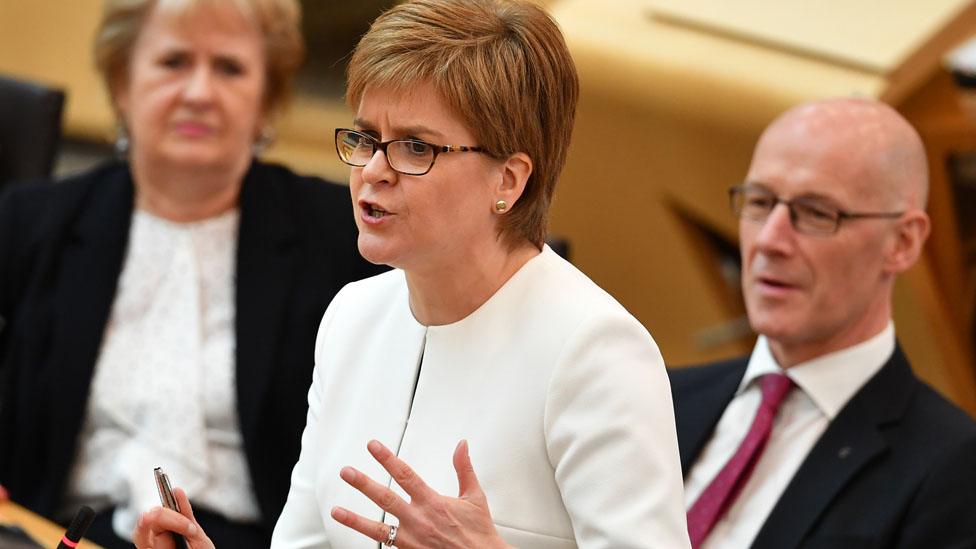
- Published2 May 2019
